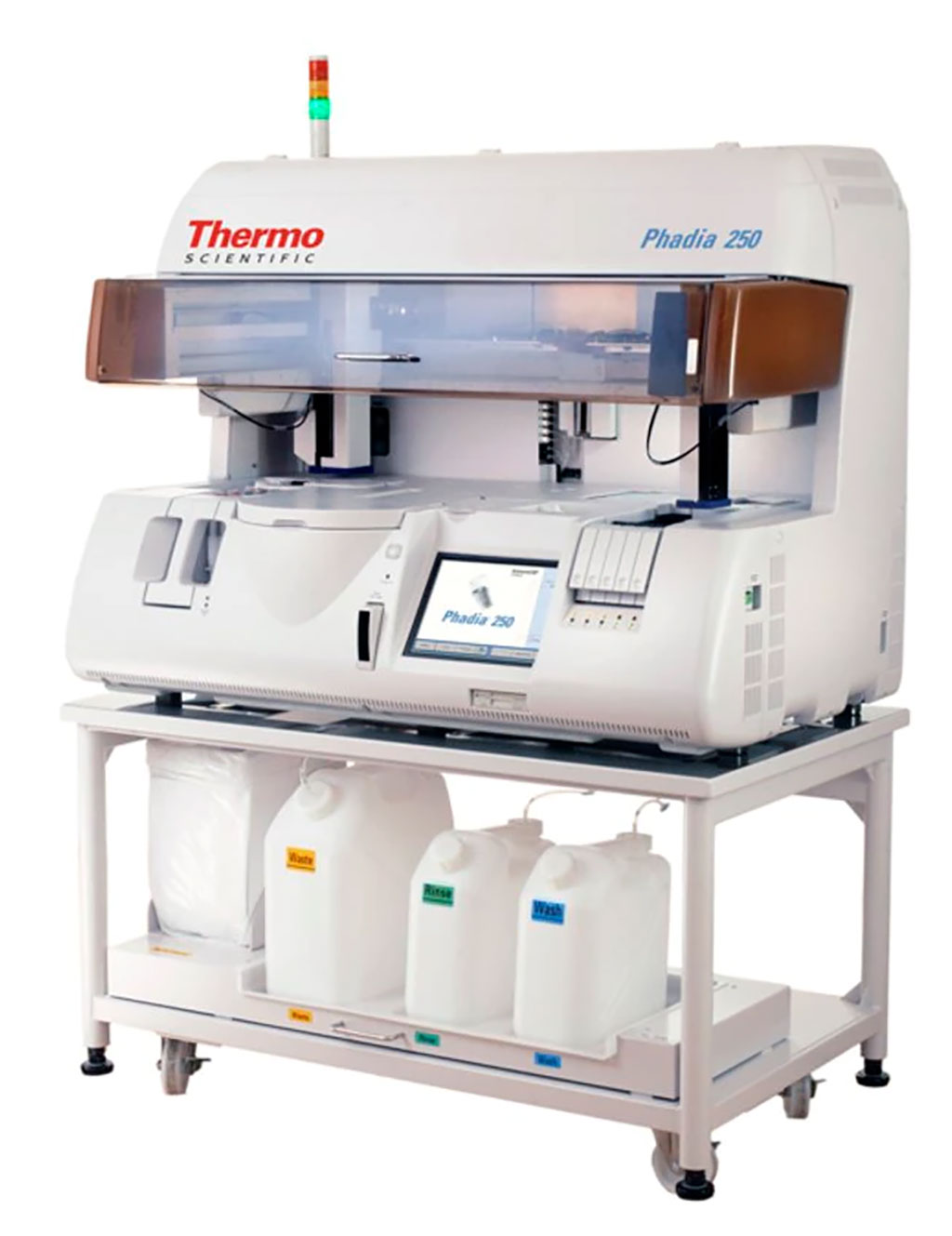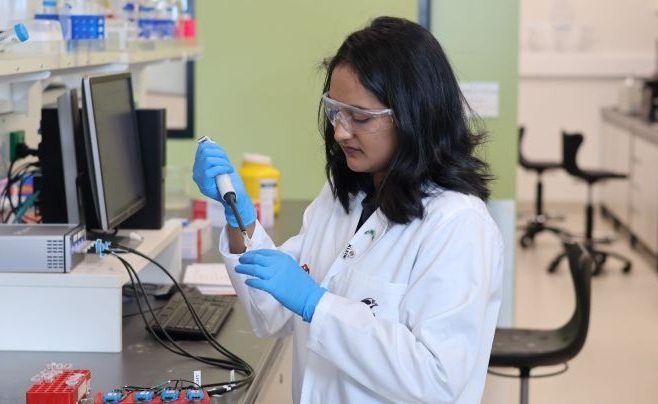Biochemical Abnormalities Among Celiac Disease Patients Referred for Antibody Testing
|
By LabMedica International staff writers Posted on 09 May 2022 |

Celiac disease (CD) is a chronic disease occurring in all age groups and affecting approximately 1% of the population, although many cases of CD remain undiagnosed. This condition is caused by an abnormal immune response in genetically susceptible individuals triggered by the ingestion of gluten proteins from wheat, rye and barley.
Celiac disease primarily affects the small intestine, often leading to malabsorption and micronutrient deficiencies. A small intestinal biopsy with recognition of villus atrophy and inflammation has been the gold standard for diagnosis; however, serological testing is increasingly used in the diagnostic process and screening for CD, mainly by the detection of CD-specific antibodies.
Clinical Scientists at the Copenhagen University Hospital (Copenhagen, Denmark) and their colleagues included in an observational cohort study 706 individuals that had received a positive CD antibody result; 72.7% were women and the mean age was 26 years. The team compared the results of those with CD-positive antibodies with individuals with CD-negative antibodies.
Tissue transglutaminase antibody (IgA) (TTG-IgA), tissue transglutaminase antibody (IgG) (TTG-IgG), deamidated gliadin peptide antibody (IgA) (DGP-IgA) and deamidated gliadin peptide antibody (IgG) (DGP-IgG) were measured in serum by fluorescence enzyme immunoassay (EIA) on the UniCAP 100 and ImmunoCAP 250 platforms (Phadia Laboratory Systems, Thermo Fisher Scientific, Hvidovre, Denmark).
Other variables used from the CopLab database were hemoglobin, erythrocytes, mean corpuscular volume (MCV), mean corpuscular hemoglobin concentration (MCHC), transferrin, hematocrit, ferritin, alanine transaminase (ALAT), alkaline phosphate, 25-OH vitamin D, folic acid, cobalamin, C-reactive protein (CRP), reticulocyte, mean corpuscular hemoglobin (ReticMCH), erythrocyte volume, relative distribution width (RDW), and immunoglobulin A.
The investigators reported a most remarkable difference between the groups was the markedly lower ferritin among CD antibody-positive individuals compared with CD antibody-negative individuals (women: 13.8 µg/L versus. 35.9 µg/L; men: 34.3 µg/L versus 80.4 µg/L), Also, CD antibody-positive individuals had a tendency for lower hemoglobin (women: 7.8 mmol/L versus 8.1 mmol/L; men: 8.5 mmol/L versus 8.8 mmol/L). The team reported lower cobalamin and folic acid levels and higher levels of transferrin, alanine transaminase and alkaline phosphate among CD antibody-positive individuals.
Compared with CD-negative individuals, the scientists reported that a greater proportion of tests among CD antibody-positive individuals exhibited hemoglobin (10.2% versus 2.7%), mean corpuscular volume (7.1% versus 2.9%), mean corpuscular hemoglobin concentration (6.8% versus 1.2%) and ferritin (37.6% versus7.6%) below the reference level, while transferrin (20.7% versus 9.5%) was above the reference interval. CD antibody-positive individuals were also more likely to have a deficiency for cobalamin and folic acid.
Line Lund Kårhus, MD, PhD, the lead author of the study, said, “This study identified several biochemical abnormalities associated with celiac disease (CD) antibody positivity in a primary care setting among individuals referred to CD antibody testing. The pattern of abnormalities suggested that micronutrient deficiencies were prevalent among CD antibody-positive individuals.”
The authors concluded that their study showed more measurements below the reference interval for hemoglobin, MCV, MCHC, ferritin, cobalamin and folic acid among the individuals with a positive CD antibody test. The pattern of the included biomarkers suggested that micronutrient deficiencies were common among CD antibody-positive individuals and confirmed malabsorption as a sign of CD. The study was published on April 18, 2022 in the journal Scientific Reports.
Related Links:
Copenhagen University Hospital
Phadia Laboratory Systems
Latest Immunology News
- Blood Test Identifies Lung Cancer Patients Who Can Benefit from Immunotherapy Drug
- Whole-Genome Sequencing Approach Identifies Cancer Patients Benefitting From PARP-Inhibitor Treatment
- Ultrasensitive Liquid Biopsy Demonstrates Efficacy in Predicting Immunotherapy Response
- Blood Test Could Identify Colon Cancer Patients to Benefit from NSAIDs
- Blood Test Could Detect Adverse Immunotherapy Effects
- Routine Blood Test Can Predict Who Benefits Most from CAR T-Cell Therapy
- New Test Distinguishes Vaccine-Induced False Positives from Active HIV Infection
- Gene Signature Test Predicts Response to Key Breast Cancer Treatment
- Chip Captures Cancer Cells from Blood to Help Select Right Breast Cancer Treatment
- Blood-Based Liquid Biopsy Model Analyzes Immunotherapy Effectiveness
- Signature Genes Predict T-Cell Expansion in Cancer Immunotherapy
- Molecular Microscope Diagnostic System Assesses Lung Transplant Rejection
- Blood Test Tracks Treatment Resistance in High-Grade Serous Ovarian Cancer
- Luminescent Probe Measures Immune Cell Activity in Real Time
- Blood-Based Immune Cell Signatures Could Guide Treatment Decisions for Critically Ill Patients
- Novel Tool Predicts Most Effective Multiple Sclerosis Medication for Patients
Channels
Molecular Diagnostics
view channel
Single-Use Test Strip to Revolutionize Disease Diagnosis
Early detection is critical for diseases such as cancer, but many biological warning signals circulate in the blood at levels too low to be reliably detected. MicroRNAs are among the most promising early... Read more
Diagnostic Device Predicts Treatment Response for Brain Tumors Via Blood Test
Glioblastoma is one of the deadliest forms of brain cancer, largely because doctors have no reliable way to determine whether treatments are working in real time. Assessing therapeutic response currently... Read moreHematology
view channel
New Guidelines Aim to Improve AL Amyloidosis Diagnosis
Light chain (AL) amyloidosis is a rare, life-threatening bone marrow disorder in which abnormal amyloid proteins accumulate in organs. Approximately 3,260 people in the United States are diagnosed... Read more
Fast and Easy Test Could Revolutionize Blood Transfusions
Blood transfusions are a cornerstone of modern medicine, yet red blood cells can deteriorate quietly while sitting in cold storage for weeks. Although blood units have a fixed expiration date, cells from... Read more
Automated Hemostasis System Helps Labs of All Sizes Optimize Workflow
High-volume hemostasis sections must sustain rapid turnaround while managing reruns and reflex testing. Manual tube handling and preanalytical checks can strain staff time and increase opportunities for error.... Read more
High-Sensitivity Blood Test Improves Assessment of Clotting Risk in Heart Disease Patients
Blood clotting is essential for preventing bleeding, but even small imbalances can lead to serious conditions such as thrombosis or dangerous hemorrhage. In cardiovascular disease, clinicians often struggle... Read moreImmunology
view channelBlood Test Identifies Lung Cancer Patients Who Can Benefit from Immunotherapy Drug
Small cell lung cancer (SCLC) is an aggressive disease with limited treatment options, and even newly approved immunotherapies do not benefit all patients. While immunotherapy can extend survival for some,... Read more
Whole-Genome Sequencing Approach Identifies Cancer Patients Benefitting From PARP-Inhibitor Treatment
Targeted cancer therapies such as PARP inhibitors can be highly effective, but only for patients whose tumors carry specific DNA repair defects. Identifying these patients accurately remains challenging,... Read more
Ultrasensitive Liquid Biopsy Demonstrates Efficacy in Predicting Immunotherapy Response
Immunotherapy has transformed cancer treatment, but only a small proportion of patients experience lasting benefit, with response rates often remaining between 10% and 20%. Clinicians currently lack reliable... Read moreMicrobiology
view channel
Comprehensive Review Identifies Gut Microbiome Signatures Associated With Alzheimer’s Disease
Alzheimer’s disease affects approximately 6.7 million people in the United States and nearly 50 million worldwide, yet early cognitive decline remains difficult to characterize. Increasing evidence suggests... Read moreAI-Powered Platform Enables Rapid Detection of Drug-Resistant C. Auris Pathogens
Infections caused by the pathogenic yeast Candida auris pose a significant threat to hospitalized patients, particularly those with weakened immune systems or those who have invasive medical devices.... Read morePathology
view channel
Engineered Yeast Cells Enable Rapid Testing of Cancer Immunotherapy
Developing new cancer immunotherapies is a slow, costly, and high-risk process, particularly for CAR T cell treatments that must precisely recognize cancer-specific antigens. Small differences in tumor... Read more
First-Of-Its-Kind Test Identifies Autism Risk at Birth
Autism spectrum disorder is treatable, and extensive research shows that early intervention can significantly improve cognitive, social, and behavioral outcomes. Yet in the United States, the average age... Read moreTechnology
view channel
Robotic Technology Unveiled for Automated Diagnostic Blood Draws
Routine diagnostic blood collection is a high‑volume task that can strain staffing and introduce human‑dependent variability, with downstream implications for sample quality and patient experience.... Read more
ADLM Launches First-of-Its-Kind Data Science Program for Laboratory Medicine Professionals
Clinical laboratories generate billions of test results each year, creating a treasure trove of data with the potential to support more personalized testing, improve operational efficiency, and enhance patient care.... Read moreAptamer Biosensor Technology to Transform Virus Detection
Rapid and reliable virus detection is essential for controlling outbreaks, from seasonal influenza to global pandemics such as COVID-19. Conventional diagnostic methods, including cell culture, antigen... Read more
AI Models Could Predict Pre-Eclampsia and Anemia Earlier Using Routine Blood Tests
Pre-eclampsia and anemia are major contributors to maternal and child mortality worldwide, together accounting for more than half a million deaths each year and leaving millions with long-term health complications.... Read moreIndustry
view channelNew Collaboration Brings Automated Mass Spectrometry to Routine Laboratory Testing
Mass spectrometry is a powerful analytical technique that identifies and quantifies molecules based on their mass and electrical charge. Its high selectivity, sensitivity, and accuracy make it indispensable... Read more
AI-Powered Cervical Cancer Test Set for Major Rollout in Latin America
Noul Co., a Korean company specializing in AI-based blood and cancer diagnostics, announced it will supply its intelligence (AI)-based miLab CER cervical cancer diagnostic solution to Mexico under a multi‑year... Read more
Diasorin and Fisher Scientific Enter into US Distribution Agreement for Molecular POC Platform
Diasorin (Saluggia, Italy) has entered into an exclusive distribution agreement with Fisher Scientific, part of Thermo Fisher Scientific (Waltham, MA, USA), for the LIAISON NES molecular point-of-care... Read more

















